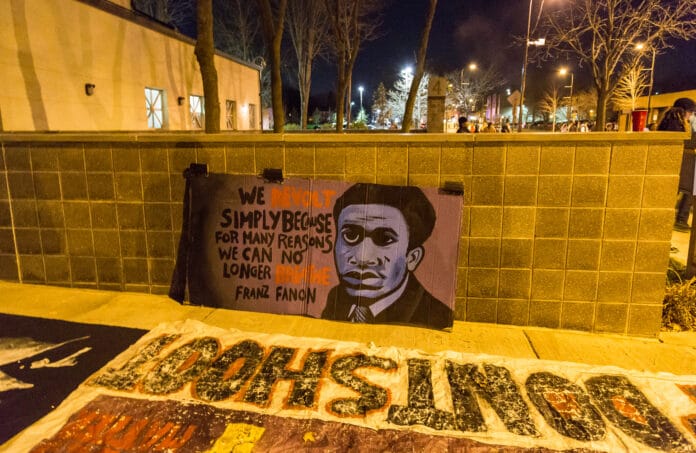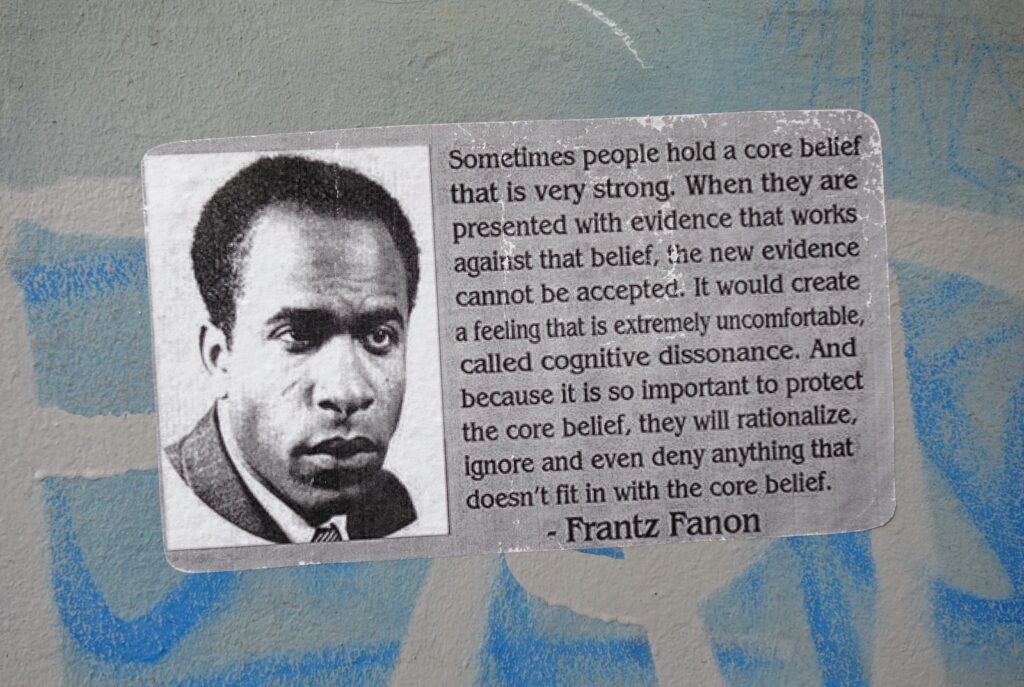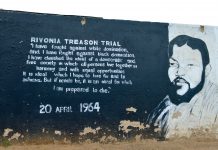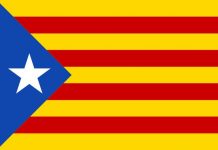
Indhold:
- Biografisk/Bibliography
- Artikler (skandinavisk)
- Articles (in English)
- Litteratur (dansk)
- Se også/See also
FRANTZ FANON: Black Skin, White Mask [1996] – a documentary by Isaac Julien, produced by Mark Nash; California Newsreel (YouTube.com, 50 min.) – University Quick Course by D. Elisabeth Glassco.
1. Frantz Fanon Biography / Bibliography
Biografisk mv.
- Fanon, Frantz (Leksikon.org)
- Frantz Fanon (Wikipedia.org). With links to works.
- Frantz Fanon (Marxists Internet Archive). Biography – Works – Further Readings (incl. Sartre’s preface from 1961).
- Frantz Fanon (Libcom.org). With articles/books online about/by Fanon.
- Frantz Fanon Bibliography (pdf). By D. Elisabeth Glassco (Debraglassco.wixsite.com). Primary (11 issue) & secondary sources (72 issues).
Fanonism (pdf) (Historical-Critical Dictionary of Marxism). By William W. Hansen (Historical Materialism, Vol.19, No.2, 2011, p.175-182; online at Berliner Institut für Kritische Theorie)
Contents: Biography – Theory of Violence – Nationalism and the culture of liberation – Fanon and Marxism – ‘Race’ and ‘class’ – Social analysis – Revolution, party, democracy – The woman question – Bibliography.
The Frantz Fanon Blog: Reading Frantz Fanon in Grahamstown, South Africa (Readingfanon.blogspot.com). “This blog contains resources directly related to Frantz Fanon’s life and work, the secondary literature on Fanon and other resources useful for engaging Fanon’s ideas here and now.”
Part 1: Master Class on Frantz Fanon with professor Lewis Gordon March 17, 2018 (Center for Contemporary Arab Studies, Georgetown University) (YouTube.com; 1:16 hour)
Part 2 (YouTube.com; 1:17.55 hour)
Artikler
På skandinavisk:
Frantz Fanons tänkande är fortfarande levande i Algeriets frihetskamp (pdf). Av Hamza Hamouchenne (Marxistarkiv.se, 13. december 2021). “Artikel från Jacobin till 60-årsminnet av Frantz Fanons död. Behandlar revolutionen i Algeriet på 1950-talet och hur den hänger samman med utvecklingen där idag.”
Hinsides kolonialismen – en kort introduktion til Frantz Fanons liv og tænkning. Af Mikkel Flohr (Friktion: Magasin for Køn, Krop og Kultur, 1. oktober 2016). “Hans indsigtsfulde analyse af den koloniale racisme og dens dehumaniserende effekter, og særligt hans skånselsløse kritik af kolonialismen tjente som inspiration for mange af den tredje verdens befrielsesbevægelser, såvel som den senere post-koloniale tænkning.”
Introduktion til Frantz Fanons kolonialismekritik. Af Sophia Wathne (Friktion: Magasin for Køn, Krop og Kultur, 1. oktober 2016). “Fanons tænkning har inspireret politiske bevægelser, som kæmper imod forskellige former for undertrykkelse, fra Palæstina til de amerikanske sydstater.”
Frantz Fanon – den koloniala frigörelsens uttolkare (pdf). Av Per-Olof Mattsson (Röda Rummet, 1/2007, s.8-12; temanummer om Kolonialvåld). Scroll ned.
“Frantz Fanons bok Jordens fördömda blev en väckarklocka i början av 1960-talet. Den satte fingret på kolonialismens djupgående inverkan på stora delar av världen och gav en förklaring till varför befrielsekampen på många håll blev så våldsam.”

Articles
In English:
Frantz Fanon’s Algerian Years on Film (Jacobin, April 7, 2025). Phineas Rueckert interviews Jean-Claude Barny: “In French-ruled Algeria, Frantz Fanon was a psychiatrist and an active member of the National Liberation Front. A new movie portrays his commitment to the anti-colonial struggle.”
Frantz Fanon and the struggle against colonisation. By Ken Olende (Rebel, October 19, 2024). “With a constant stream of media exposing genocidal war in Palestine, child labor in the Congo, and Indigenous struggles in South America, neoliberalism’s colonial nature is clearer than ever. Now is the time to return to the works of Fanon and explore a radically different future liberated from coloniality.”
Frantz Fanon and the paradox of anticolonial violence. By Alan Wald (Against the Current, Issue 230, May-June 2024). “Are you the kind of socialist activist looking for easy answers to questions about revolutionary violence, or who hungers for uplifting political biographies of icons of radical commitment? If so, Adam Shatz is a writer you should probably shun. His two recent books are testaments to a fierce curiosity that evokes the more perplexing and incongruous aspects of intellectuals and their social responsibility, often with a unique emphasis on anticolonialism.”
“For the outcasts and by the outcasts”: understanding all of Fanon’s warnings. By Leo Zeilig (International Socialism, Issue 182, Spring 2024). “Fanon, and the almighty struggle against the French occupation of Algeria in the 1950s and 1960s, gives us some important pointers on how we can support struggles for national liberation today, while also providing critical analysis of the pitfalls of that very liberation.”
Frantz Fanon: Martinican, French, Algerian, African Revolutionary (Anticapitalist Resistance, 18 February 2024). Review of Adam Shatz, The Rebel’s Clinic: The Revolutionary Lives of Frantz Fanon (Bloomsbury, 2024, 464 p.). “Ian is reading a new full account of Fanon’s short life and work.”
See also review by Alvaro Lopez, The making of Frantz Fanon (Jacobin, March 8, 2024).
Frantz Fanon, racism and revolution (Socialist Worker, Issue 2883, 25 November 2023). “Frantz Fanon was part of the Algerian Revolution against French colonialism in the 1950s. He fashioned lessons learned from it into writing that remains essential. But along with great strengths, his ideas contained serious weaknesses. Socialist Worker assesses his record.”
How Frantz Fanon was transformed by the Algerian Revolution. By Peter Hudis (Jacobin, January 18, 2022). “There was nothing abstract about Frantz Fanon’s political vision for the Global South: it was forged in the Algerian liberation struggle. Fanon’s role in that struggle convinced him that national independence would be hollow without social revolution.” See also review by Ian Parker (
Who owns Frantz Fanon’s legacy? By Bashir Abu-Manneh (Jacobin, December 10, 2021/Catalyst, Vol.5, No.1, Spring 2021). “Frantz Fanon’s The Wretched of the Earth captures the revolutionary possibilities of decolonization. Yet the book has been marred by a misreading that ignores Fanon’s socialism and class analysis, and turns the great thinker into a prophet of violence.”
In Algeria’s freedom struggle, the spirit of Frantz Fanon is still alive. By Hamza Hamouchene (Jacobin, December 6, 2021). “Frantz Fanon died 60 years ago today. In his last decade, he was deeply involved in Algeria’s anti-colonial struggle — providing lessons that can still be used in the country’s fight against dictatorship today.”
Frantz Fanon’s enduring legacy. By Pankaj Mishra (The New Yorker, November 29, 2021). “The post-colonial thinker’s seminal book, ‘The Wretched of the Earth’, described political oppression in psychological terms. What are its lessons for our current moment?”
Frantz Fanon and the revolution against racism. By Daniell Finn (Jacobin, September 7, 2021). Interview with Peter Hudis: “Frantz Fanon was one of the most influential revolutionary thinkers of the last century. His work, produced in the heat of anti-colonial revolution, is full of insights for the struggle against racism and capitalism today.”
Frantz Fanon and the Algerian revolution today. By Hamza Hamouchene (ROAPE, May 6, 2021). “In the first of a two-part blogpost, Hamza Hamouchene provides a brief historical account of Fanon’s anti-colonial thought, his critique of the postcolonial ruling elites and the new popular movement (Hirak) engulfing Algeria.”
The revolutionary humanism of Frantz Fanon. By Peter Hudis (Jacobin, December 26, 2020). “The philosopher, psychiatrist, and revolutionary militant Frantz Fanon was a key figure in the struggle against European colonialism. Fanon’s innovative thinking on racism and its relationship to class oppression still speaks vividly to the present.”
Racism and the logic of Capitalism: A Fanonion reconsideration. By Peter Hudis (Historical Materialism, Vol.26, No.2, 2018). “For Fanon, what makes racism especially deadly is that it denies recognition of the dignity and humanity of the colonised subject.”
Forgetting Fanon, remembering Fanon (Verso, Blog, 20 July 2017). “In this extract from Fanon: A Biography, David Macey explores the afterlives of Fanon’s thought.”
A revolutionary lifeline: Teaching Fanon in a postcolonial world. By Sara Salem (Historical Materialism, Blog, 16 August 2017). “In this piece, I want to first discuss the politics around teaching Fanon in today’s postcolonial world, and in particular in a post-Brexit Britain.”
Frantz Fanon: Decolonisation through revolution. By Chris Newlove (International Socialism, Issue 154, Spring 2017, p.169-178). Review of books by Peter Hudis, Lewis R Gordon and Leo Zeilig: “The last few years have seen a renewed interest among activists and within academia in the life and work of Frantz Fanon … All three books skilfully mix details of Fanon’s life with his central ideas.”
Where life is seized. By Adam Shatz (London Review of Books, Vol.39, No.2, 19 January 2017). Review of Frantz Fanon, Écrits sur l’aliénation et la liberté by Frantz Fanon, edited by Robert Young and Jean Khalfa (La Découverte, 2015, 688 p.). “The pursuit of freedom lies at the heart of [the] immense new volume of Fanon’s uncollected writings that includes his youthful literary efforts, psychiatric notes and papers, articles on Algeria and Third World liberation struggles and correspondence …”
Frantz Fanon. By Shane Hopkinson (Marx & Philosophy Review of Books, 19 December 2016). Review of Lewis R Gordon, What Fanon Said: A Philosophical Introduction to his Life and Thought (Hurst & Company, 2015, 216 p.) + Peter Hudis, Frantz Fanon: Philosopher of the Barricades (Pluto Press, 2015, 176 p.) + Leo Zeilig, Frantz Fanon: The Militant Philosopher of Third World Liberation (I.B. Taurus, 2016, 296 p.). “Each of the three books follow Fanon’s life and work in chronological order, each with a different focus, but all are concerned with making Fanon relevant to contemporary social struggles.”
Why Frantz Fanon’s call to rise against racism still resonates today (Socialist Worker, Issue 2516, 14 August 2016). “Frantz Fanon was a giant of the fight against colonialism. Chris Newlove hails a revival of his ideas, and argues for taking them further, not letting academia tone them down.”
Revisiting Frantz Fanon: memories and moments of a militant philosopher. By Leo Zeilig (Europe Solidaire Sans Frontières, 25 May 2016). “… one of Africa and the modern era’s most celebrated revolutionaries, whose views remain influential long after his death. This is an edited extract … his philosophical work and interests were always contingent on action and contributing to real practice.”
Frantz Fanon: Toward a Revolutionary Humanism. By Karthick Ram Manoharan (Marx & Philosophy Review of Books, 24 March 2016). Review of Christopher J. Lee’s book (Ohio University Press, 2015, 264 p.). “Lee provides a whirlwind tour of Fanon’s life, ideas and context.”
Militant Philosopher of Third World Liberation. By Trevor Ngwane (Review of African Political Economy, 11 December 2015). Review of Leo Zeilig’s book (I.B. Tauris, 2015, 296 p.). “This book is also a subtle and sympathetic engagement with Fanon’s life project: decolonisation and the plight of the national liberation movement in Africa.”
Frantz Fanon for our times: Reflections on Peter Hudis’s biography of Fanon. By Tithi Bhattacharya (The International Marxist-Humanist, November 11, 2015). Review of Peter Hudis, Frantz Fanon: Philosopher of the Barricades (Pluto Press, 2015, 176 p.). “Peter Hudis has written a wonderful biography of Frantz Fanon.”
See also Peter Hudis: Frantz Fanon: race, class, and a new humanism (The International Marxist-Humanist, October 19, 2015).
Frantz Fanon: The militant philosopher of third world liberation (RS21: Revolutionary Socialism in the 21st Century, October 25, 2015). “Leo Zeilig’s biography of Frantz Fanon is out on 5 November. Here are a few teasers from the book with introductions by the author.”
What Fanon Said. By Kulsoom Mall (Socialist Review, Issue 406, October 2015). Review of Lewis R Gordon, What Fanon Said: A Philosophical Introduction to His Life and Thought (Hurst, 2015, 216 p.). “Gordon has contextualised Fanon’s words in an impressive analysis of his texts in relation to other thinkers and critics.”
Essay: We all can’t breathe’: reflections on Marx’s humanism and Fanon. By Mohammed Elnaiem (News & Letters, January-February 2015). “Estrangement in capitalism stems from appropriated labor, the denial of human autonomy; estrangement in racism stems from the denial of human autonomy by dehumanization …”
CLR James, Frantz Fanon and the meaning of liberation. By Kenan Malik (Pandaemonium, April 16, 2012). “One figure stood at the crossroads, looking back towards the universalist ideals of L’Ouverture and James and forward to the separatist visions that were to dominate. Frantz Fanon was a psychiatrist, philosopher and revolutionary who wrote two works that, perhaps more than any others, came to shape anti-colonial movements.”
Pitfalls and radical mutations: Frantz Fanon’s revolutionary life. By Leo Zeilig (International Socialism, Issue 134, Spring 2012, p.141-166). “Despite the scope of Fanon’s work this article will limit itself to a general introduction to the main contours of his life and work. Modestly it aims to provoke further curiosity and investigation.”
Veneration and Struggle: Commemorating Frantz Fanon (Journal of Pan African Studies, JPAS, Vol.4, No.7, 2011).
Theme: The 50th Anniversary of Fanon: Culture, Consciousness and Praxis:
Part I: Philosophical and Theoretical Perspectives
Part II: Fanon as Praxis
Part III: Literary Reflections on Fanon
Part IV: Fanon and African Unity
Frantz Fanon’s struggle (Socialist Worker, Issue 2283, 17 December 2011). “Leo Zeilig looks back at the life and work of Frantz Fanon, the author, psychiatrist and anti-colonial revolutionary, died 50 years ago, and interviews some of those who knew him.”
Champion of the wretched (Socialist Review, Issue 364, December 2011). “Leo Zeilig looks back at Fanon’s extraordinary life and the lessons his groundbreaking work has for us today.”
Frantz Fanon fifty year years later. By Richard Pithouse (CounterPunch, December 9-11, 2011). “Fifty years after Fanon’s death there are all kinds of ways in which his work speaks directly and with tremendous illuminating power to the current situation in South Africa. One of the many aspects of our situation to which we can summon Fanon’s illumination is the need for us to affirm a politics of ordinary women and men, against Thermidor.”
The legacy of Frantz Fanon. By Sheila McGregor (Socialist Worker, Issue 2052, 26 May 2007). “Colonisation was a violent process that destroyed old ways of life and robbed the colonised of their means to live with dignity. Fanon argued against those who believed in limiting struggle to non-violent protest. A violent colonial power could only be broken by violent means, he said … However, other aspects of Fanon’s views on violence are more problematic.”
Frantz Fanon and the construction of the colonial subject: defining ‘The Enemy’ in the Iraq War. By Daniel Egan (Socialism and Democracy, Vol.21, No.3, November 2007). “Fanon’s theorization of global capitalism as both a racial and a class system is especially valuable for understanding the Iraq war in all its complexity. His theory’s grounding in the Algerian national liberation struggle4 gives it added relevance.”
Africana Critical Theory: Reconstructing the Black Radical Tradition, from W. E. B. Du Bois and C. L. R. James to Frantz Fanon and Amilcar Cabral (pdf). By Reiland Rabaka (Lexington Book, 2007, 430 p.). Chapter 5: Frantz Fanon: Revolutionizing the Wretched of the Earth, radicalizing the discourse on decolonization (p.165-226). Scroll down.
Frantz Fanon & the post-colonial imagination. By Richard Pithouse (The Sunday Independent, Johannesburg, 2003). Review of Nigel Gibson, Frantz Fanon: The Postcolonial Imagination (Polity Press, 2003). “This book is an excellent introduction to the ideas and legacy of Fanon. Gibson explores Fanon as a truly complex character in the context of his time and beyond.”
Franz Fanon – A life. By Ciaran Mulholland (Socialistworld.net, 30 April 2002). Review of David Macey’s book (Granta Books, 2000, 640 p.). “It is an excellent and exhaustive account of Fanon, the psychiatrist, the revolutionary, and the writer — a man who asked questions.” See also review by John Alan: Remembering Fanon (pdf) (News & Letters, August-September 2001, p.1 + 10).
Frantz Fanon and Marxist-Humanism. By David Black (Hobgoblin, Issue 3, 2002). Review of Nigel C Gibson (ed.), Rethinking Fanon: the Continuing Dialogue (Humanity Press, 1999). “This anthology edited by Nigel Gibson features 16 contributors. It covers Fanon’s politics and revolutionary activities, his philosophy of a ‘new humanism’, his contribution to psychiatry and cultural criticism, and his views on gender and nationalism.”
40 years since Fanon’s Dying Colonialism (pdf). By Lou Turner (News & Letters, vol. 44, No. 10, December 1999). “It’s been 40 years since Frantz Fanon’s second and perhaps least examined work, A Dying Colonialism, was published and immediately banned by France’s colonial-imperialist government of Charles de Gaulle.”
“Fanon and the revolutionary class”. Chapter 2 in Immanuel Wallerstein: The Essential Wallerstein (pdf) (The New Press, 2000, p.14-32). “I felt it necessary to elucidate Fanon’s position which seemed to me more on the mark than that of his critics.” Scroll down.
Frantz Fanon. By Ian Birchall (International Socialism, Issue 60, July 1973). Review of Irene L. Gendzier, Frantz Fanon: A Critical Study (Wildwood House, 1973). “The interest of Gendzier’s book is that it is basically an intellectual biography, showing how Fanon took his ideas from a number of sources in order to weld together a critique of the colonial situation.”
Frantz Fanon and the ‘Lumpenproletariat’. By Peter Worsley (The Socialist Register, 1972, p.193-230). “… his views on violence and on the revolutionary potential of the lumpenproletariat, which I discuss below, reopened issues which had not received much attention since the era of Bakunin. He acquired most of his intellectual stock of ideas, however, from two well-developed traditions with which, as a French colonial subject, he inevitably came into contact: the tradition of Black protest in the form of négritude, and the existentialist and Marxist traditions.”
Frantz Fanon and problems of independence (1963). By Nguyen Nghe (Viewpoint Magazine, Issue 6, February 2018). “Khac Vien [under the pseudonym Nguyen Nghe] approaches Wretched of the Earth from the perspective of the people’s war in Vietnam, and reads the text as a condensation of the experience of the Algerian Revolution, complicating certain entrenched understandings of Fanon’s thought.”
The rebel’s weapon (1961). By Jean-Paul Sartre (Socialist Review, Issue 290, November 2004). Extracts from the introduction to Fanon’s book The Wretched of the Earth. See Sartre’s full preface at Marxists Internet Archive.
Litteratur (dansk)
- Frantz Fanon. Af David Caute (Gyldendals Uglebøger, 1970, 106 sider).
- Fordømte her på jorden. Af Frantz Fanon. Oversat af Lis Thorbjørnsen, forord af Jean-Paul Sartre (Rhodos, 1966, 214 sider). Genudgivet i Rhodos’ serie Politisk Orientering (1968, 253 sider). Ny udgave/oversættelse på Informations Forlag (2021, 464 sider).
- Racisme og kultur. Af Frantz Fanon (Sirius, 1967, 92 sider).
Video/Podcast
Why Frantz Fanon Matters for Today’s Struggles? Part 1 of 2. With Peter Hudis (YouTube.com, 21:29 min.). “… about the philosophy of Frantz Fanon and how it is applicable in our contemporary struggle against racism, police brutality, and inequality.”
This is Revolution: Assessing the Legacy of Frantz Fanon with Peter Hudis (Podcast: YouTube.com, 2:18 h.)
Se også/See also:
- Tidslinjen/Timeline 1. november 1954 om den algierske uafhængighedskrigss start (Socialistisk Bibliotek)
- Tidslinjen/Timeline 17. oktober 1961 om massakren i Paris (Socialistisk Bibliotek)
- Tidslinjen/Timeline 5. juli 1962 om Algeriets uafhængighed (Socialistisk Bibliotek)
- Linkboxen/link collection Filmen “Slaget om Algier” /The Battle of Algiers (Socialistisk Bibliotek)
- History of Algerian Independence (Marxists Internet Archive)
- Marxism and Anti-Imperialism in Africa (Marxists Internet Archive)
















![George Habash square [Tulkarem?], Taken on 7 April 2011, Source: https://www.panoramio.com/photo/50717122. Author: Mujaddara. (CC BY-SA 3.0)](https://socbib.dk/wp-content/uploads/2007/05/George_Habash_sq_-_panoramio-218x150.jpg)














